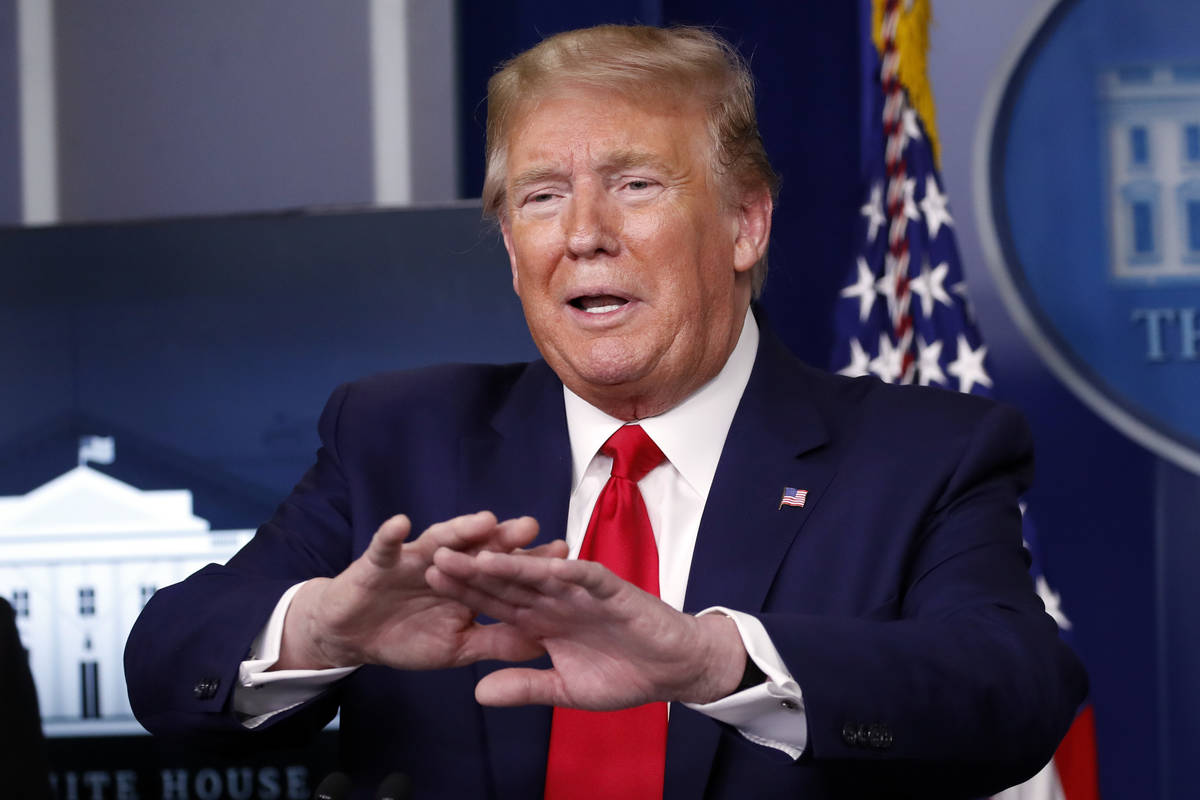Senate passes $500 billion coronavirus relief bill
WASHINGTON — The Senate passed a nearly $500 billion interim relief bill Tuesday to pump more money into small businesses struggling from the coronavirus outbreak and funnel federal spending to hospitals and testing that governors such as Nevada’s Steve Sisolak say is needed to open the economy.
The bill was passed by unanimous consent after congressional leaders reached an agreement with the White House to provide more access to small business loans to underserved and minority-owned businesses, sought by Nevada lawmakers and those from other states.
Both Nevada Democrats, Catherine Cortez Masto and Jacky Rosen, supported passage of the interim spending bill.
“Testing is key to any discussion about restarting America’s economy and we’re fighting to do all we can to make sure Gov. Sisolak has every resource available so we can restart Nevada’s economy, and get Nevada back to work,” Cortez Masto and Rosen said in a joint statement.
The National Governors Association headed by Gov. Larry Hogan, R-Md., has pushed back on President Donald Trump’s claim that governors have the testing to open up their states despite the warnings from public health officials that more testing is needed.
Money for testing also was not included in a version of the bill unveiled by Republicans last week.
Senate Majority Leader Mitch McConnell, R-Ky., however, said the GOP supported funds for hospitals and testing.
McConnell said the bill was a “significant package” to continue a Small Business Administration program already saving millions of jobs “and helping Americans get paychecks instead of pink slips.”
The SBA’s Payroll Protection Program received $350 billion in the $2.2 trillion package passed by Congress last month. But money from that fund ran out, and the interim spending package added about $330 billion more.
Trump has said he would sign the bill once it reaches his desk.
The House is expected to take up the bill on Thursday, and the parameters of the deal were applauded by Nevada lawmakers who also won concessions that more of the state’s needs would be addressed in a fourth relief bill that Congress is expected to write next week.
“I’m pleased that this interim package also includes more funding for hospitals, medical research and testing,” said Rep. Dina Titus, D-Nev.
Titus said more needs to be done in the next package to help the state.
Although the interim bill would not give Nevada small businesses with gaming revenue access to PPP loans, changes in that program, and funds for state, local and tribal governments are expected in the next bill.
“After I sign this Bill, we will begin discussions on the next Legislative Initiative with fiscal relief to State/Local Governments for lost revenues from COVID-19,” Trump wrote on Twitter.
Although Republicans hailed the interim bill, Democrats claimed victory after they blocked a trimmed version last week that included only new funds for the paycheck program without additional aid.
Democrats wanted more funds for hospitals, state-led testing and money for states and local governments. Negotiations resulted in $75 million for hospitals and $25 million for state-led testing.
With additional paycheck protection funding, Democrats and Republicans negotiated $30 billion to be distributed by community financial institutions in rural and underserved areas and $30 billion for rural, minority-owned or women-owned businesses.
Cortez Masto and Rosen fought for the inclusion of money to be distributed by community financial institutions to provide access to mom and pop shops in the Silver State that were unable to access the first tranche of loans.
Senate Minority Leader Chuck Schumer, D-N.Y., said the changes were necessary to address the businesses left out, the mom and pop stores, hair salons and other small businesses.
“Every member of our caucus heard from businesses in their states who couldn’t access federal lending because they didn’t have a prior relationship with a big bank,” Schumer said.
The package also increased the amount of SBA disaster loans and grants.
Nevada’s congressional delegation favored increased access to PPP loans to underserved and rural communities, as well as businesses with gaming revenues that were ineligible due to SBA requirements.
Even when Treasury Secretary Steven Mnuchin had the formula altered, more that 265 Nevada taverns, truckstops and small casinos were ineligible for the loans.
Democrats said they have received assurances that those needs would be addressed in the next relief legislation, that is expected to be large in scope and with a hefty price tag to help small cities and rural communities receive funds to offset losses in revenue.
Despite partisan jabs thrown by McConnell and Schumer, Republicans and Democrats have negotiated and used parliamentary tactics to streamline enormous funding bills to address the public health and economic impact of the coronavirus with bipartisan support.
“The hard work of bipartisan negotiation paid off,” Schumer said, as Democrats praised Mnuchin and White House chief of staff Mark Meadows for moving the talks forward.
Sen. Mike Lee, R-Utah., said Congress was working together as health care providers work round the clock, as well as grocers, pharmacists, truck drivers and even the media work overtime.
Lee said the Senate should be called back to vote on the measure in a roll call vote, although he did not hold up that legislation that is expected to be signed by Trump by week’s end.
Contact Gary Martin at gmartin@reviewjournal.com or 202-662-7390. Follow @garymartindc on Twitter.











































